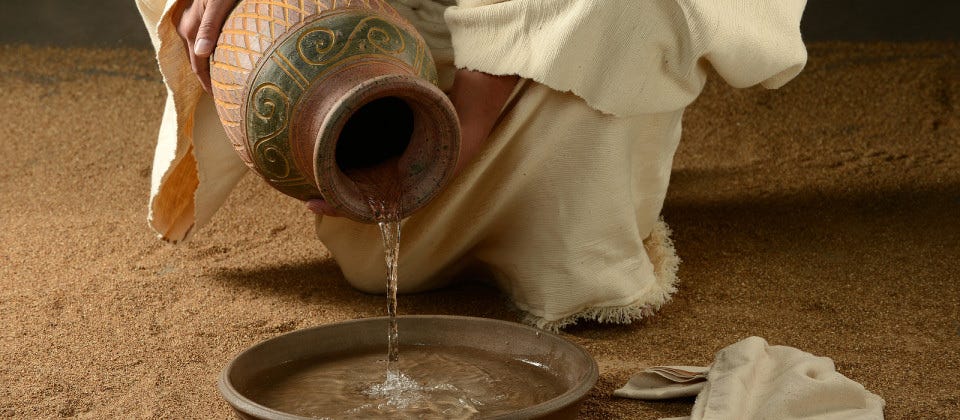With some help from my friends
On not being gods, kenosis, and other forms of moral stupidity we reject at our peril
As a former pastor, no longer working in a church, I’m not desired by employers in this economy. So while I grind away at school, I work part-time in the wine and tourism industry of the region where I live.
The other night, I worked late. And after the shift, a few of my fellow employees and I were sitting around the kitchen (which I had just cleaned), having a glass of wine and shooting the shit. And eventually, one of my co-workers and I got to talking about the then-recent Ontario election. It wasn’t a contentious conversation; no voices were raised or pots thrown. It was all very polite, very Canadian.
One moment stood-out to me: I lamented the victory of the incumbent party, concerned as I am about their inactivity on the growing number of people falling into homelessness, the price of housing in my province, how much we pay (or don’t pay) workers (like us), et. cetera. My co-worker, a smart, business-minded kid in his early twenties, agreed that those things do suck. But his counterpoint was this (and I paraphrase): If Ontario as a province, or Canada as a nation, forces our businesses to sacrifice for the common good, then other nations who don’t compel their businesses to do the same will pull further ahead of us. Then our economy will weaken – and what good will it do, anyway? And then when it comes to other issues, like the damage we’re doing to the environment, if we make sacrifices to curb our negative impacts but other nations don’t, then, again: What good will it do?
To carry his argument further, I might add to his points one more: If we insist on putting people — particularly those in poverty — or some hypothetical “common good” ahead of our businesses’ capacity to grow in pursuit of profit, won’t that mean our businesses will make less money? That’s something some businesses can’t survive. Is that really worth it?
Now, I’m not an economist, so I can’t really contribute to the discussion about how businesses and economies endlessly growing is an absolute delusion. But I do want to pose a question (not original to me) that’s being asked a lot, right now: What is society actually for?
Is our society — our civilization — meant just to lend structure and legal authority to our compulsion to build hierarchies? Is the point of it to reinforce and perpetuate our current experience of some people having too much and other people having too little? Is it to nurture an ecosystem which has as its principle function the generation of wealth? Is it to pass on, from one generation to the next, a life lived with a metaphorical ladder in front of us that we all must climb and cling to, or otherwise fall off of and disappear into poverty, or uselessness, or exploitation?
I don’t think so. And if you’re reading this, I bet you don’t either. “Society” is just the word that we give, on a large scale, to humans working together to survive and do life. It’s what we’ve been doing, forever — that’s why there are humans at all. That’s our super power: That we’re capable of cooperating, and of working together to solve problems for our mutual benefit.
But this demands compromise. And for whatever reason, we’re living in a time that hates to compromise; that hates the idea that somebody else might benefit at my expense, regardless of what I have.
In the New Testament, in Paul’s letter to the church in Philippi, there’s this famous bit in the second chapter where Paul encourages the Christians there to work together. He encourages them not to be vain or conceited or shitty to each other, but instead to be like Christ. And what does that mean in that context? Paul goes on to describe Christ as one who “emptied himself,” who “didn’t consider equality with God something to be clung to.” This is a concept in Christian theology called ‘kenosis’, or sometimes ‘kenotic Christology’. It’s a beautiful metaphor: That Christ, instead of sitting on a throne above humanity, would instead step down from that throne. That he would do it intentionally, and that he would pour himself out — would empty himself — for the good of everyone else.
The notion, as it’s written in Philippians 2, is that this is what God is like; what our highest ideal and our transcendent vision of ultimate reality has as its own chosen way of behaving. That has incredible existential implications if you assert it, and has some pretty profound things to say about what we think a good human life is.
I’m not trying to say that you should be martyred and die to end poverty, or that you should sacrifice your small business to try to solve homelessness. Rather, I think the wisdom on offer here is that clinging to power or to privilege or to some ideal of more and yet more is not a path that leads to deep or meaningful life. In fact, I think what is narrativized here, and what is on display in the stories about Jesus, are reminders: That willingly “pouring ourselves out”, sharing from our power and positions and privileges and resources — rather than hoarding them — that this is, in the end, one of the things that makes humans human.
When we stop looking out for each other, we dehumanize each other and we dehumanize ourselves. When we imagine ourselves to be the gods or the protagonists of our own private life stories, we risk losing touch with the best parts of ourselves, that parts that we create together and share with others. Other people are not NPCs in our video games. We are all human beings, and helping one another is what makes us great.
I wish every successful business leader valued their employees at least as much as they value their own margins. I wish every landlord cared about their tenants as much as they cared about their market value. I wish every commuter with a car cared about public transit, every DINK cared about publicly-subsidized child care, and every lifelong Canadian cared about the experiences of new immigrants.
Because in the end, “each other” is what makes life great.
Thanks for reading, friend.






